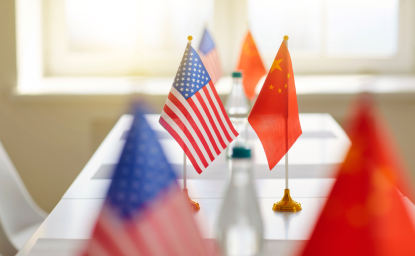President-elect Donald Trump has unfinished business from his first term to attend to on trade. No, not tariffs. Trump needs to go on the offensive and finish what he started on digital trade.
Digital trade covers a lot of things, from buying books online to watching movies on streaming services to exchanging data across supply chains. As the Office of the United States Trade Representative (USTR) explains, “[s]ome portion of nearly every business is digitally enabled, and every industry leverages digital technology to compete.”
Not surprisingly, digital trade has an enormous impact on the US economy. The Congressional Research Service observes that digital trade supports 7.7 million American jobs, and 5% of US GDP. The Information Technology Industry Council (ITI) points out that digital trade tallies for 55% of America’s traded services exports, equating to nearly a trillion dollars in sales annually.
Yet the promise of digital trade is being held up by taxes and regulatory obstacles that are being rolled out by governments around the world. In its 2024 National Trade Estimate Report, for example, the USTR points a finger at Canada’s new digital services tax, China’s “expansive state control” over the collection, storage, processing, and sharing of data,” India’s limitations on electronic payment providers, and the growing list of countries that impose “data localization” requirements on US service providers.
To lower these and other barriers to digital trade, 76 countries set out in 2019 to negotiate a “plurilateral” agreement under the auspices of the World Trade Organization (WTO). The deal, known as the Joint Statement Initiative on Electronic Commerce, would set out provisions to be reciprocated among a “coalition of the willing,” not the full WTO membership. The US played a lead role, prioritizing the elimination of digital taxes, data localization and forced-tech transfer, as well as the protection of source code, among others.
Last July, some 90 countries agreed to the text. The US was not among them. That’s because the Biden administration pulled out of the Joint Statement Initiative, answering the demands of a few in Congress. Their suggestion that retreating on digital trade would open more “policy space” in which to regulate Big Tech is contested by others.
Digital trade rules already included exceptions to create policy space in specific circumstances, such as national security. Under the Comprehensive and Economic Trans-Pacific Partnership, for example, protections for source code don’t apply to critical infrastructure. The digital trade chapter of the US-Mexico-Canada Agreement (USMCA) also includes exceptions, the proviso being that these shouldn’t result in measures that are “arbitrary or unjustifiable,” or “a disguised restriction,” or overly trade restrictive. The July text of the Joint Statement Initiative followed suit.
What the text doesn’t do is cover source code. Or cryptography. Or data localization. Why? Because without US leadership, the coalition of willing chose a different course.
The Trump administration should reassert US preferences, as per its 2019 communication. American auto makers, who are increasingly morphing into tech companies with the “Information of Things,” need more digital trade. So do our ranchers and farmers, who use AI platforms to comply with regulations on food traceability, for example. These opportunities, in turn, will create new businesses, many of which will tap America’s strengths in exporting services and intellectual property.
The US to staying out of the Joint Statement Initiative will only benefit China. Indeed, Senator Ron Wyden (D-OR) called Biden’s retreat a “win for China, plain and simple.” Likewise, Senator Mike Crapo (R-ID) explained that “[w]e have warned for years that either the United States would write the rules for digital trade or China would. Now, the Biden Administration has decided to give China the pen.”
It’s clear what China plans to do with the pen. Beijing has a strong preference for narrowing the definition of digital trade and little desire to protect personal data or source code. Moreover, as USTR explained in its 2023 Special 301 Report, China tolerates online censorship, piracy, and the theft of intellectual property in US exports of traded services.
When Congress took up Trump’s signature trade deal, USMCA, 90% of the House and Senate voted in favor of digital trade. The President-elect should finish what he started in his first term and update the WTO’s Joint Statement Initiative to fully account for America’s preferences on digital trade.
Author

Karl F. Landegger Professor of International Business Diplomacy at the Edmund A. Walsh School of Foreign Service at Georgetown University

Wahba Institute for Strategic Competition
The Wahba Institute for Strategic Competition works to shape conversations and inspire meaningful action to strengthen technology, trade, infrastructure, and energy as part of American economic and global leadership that benefits the nation and the world. Read more

Explore More
Browse Insights & Analysis
Bridging the Transatlantic Digital Divide: KAS-Wilson Center Reflections

Election Outcome Could Alter Relations with China, US


